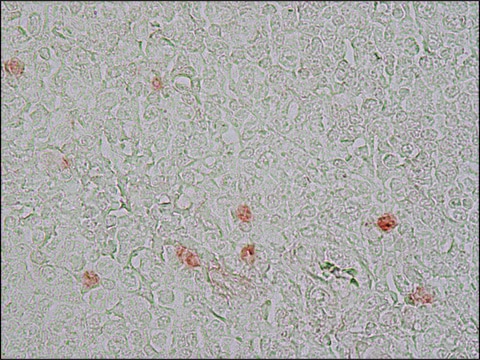P8999
Anti-p53 antibody, Mouse monoclonal
clone DO-7, purified from hybridoma cell culture
Sinónimos:
Anti-TRP53, Anti-Transformation-related protein 53
About This Item
Productos recomendados
biological source
mouse
Quality Level
conjugate
unconjugated
antibody form
purified immunoglobulin
antibody product type
primary antibodies
clone
DO-7, monoclonal
form
buffered aqueous solution
mol wt
antigen ~53 kDa
species reactivity
human
concentration
~2 mg/mL
technique(s)
immunocytochemistry: suitable
immunohistochemistry: suitable
immunoprecipitation (IP): suitable
indirect ELISA: suitable
western blot: 0.1-0.2 μg/mL using human A431
isotype
IgG2b
UniProt accession no.
shipped in
dry ice
storage temp.
−20°C
target post-translational modification
unmodified
Gene Information
human ... TP53(7157)
¿Está buscando productos similares? Visita Guía de comparación de productos
General description
Application
- immunoblotting
- enzyme linked immunosorbent assay (ELISA)
- immunocytochemistry
- immunohistochemistry
- immunoprecipitation
Biochem/physiol Actions
Physical form
Disclaimer
¿No encuentra el producto adecuado?
Pruebe nuestro Herramienta de selección de productos.
Optional
related product
Storage Class
10 - Combustible liquids
wgk_germany
WGK 3
flash_point_f
Not applicable
flash_point_c
Not applicable
ppe
Eyeshields, Gloves, multi-purpose combination respirator cartridge (US)
Certificados de análisis (COA)
Busque Certificados de análisis (COA) introduciendo el número de lote del producto. Los números de lote se encuentran en la etiqueta del producto después de las palabras «Lot» o «Batch»
¿Ya tiene este producto?
Encuentre la documentación para los productos que ha comprado recientemente en la Biblioteca de documentos.
Artículos
p53 regulates gene expression, cell cycle control and functions as a tumor suppressor. Inactivation of p53 is closely tied to cancer development.
Cancer stem cell media, spheroid plates and cancer stem cell markers to culture and characterize CSC populations.
Cancer stem cell media, spheroid plates and cancer stem cell markers to culture and characterize CSC populations.
Cancer stem cell media, spheroid plates and cancer stem cell markers to culture and characterize CSC populations.
Nuestro equipo de científicos tiene experiencia en todas las áreas de investigación: Ciencias de la vida, Ciencia de los materiales, Síntesis química, Cromatografía, Analítica y muchas otras.
Póngase en contacto con el Servicio técnico








